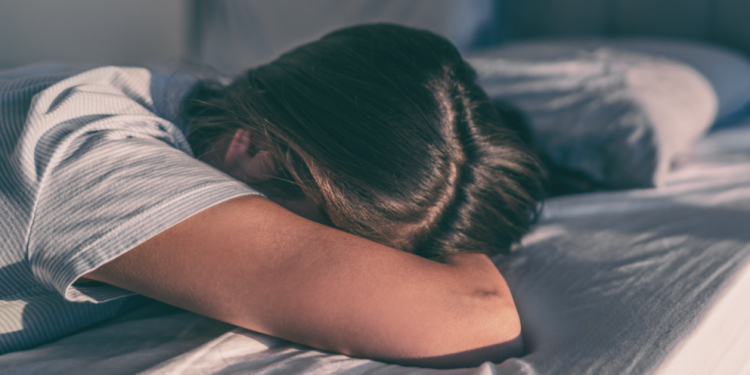by Shauna Hahn
It is estimated sleep disturbances occur in 30-70% of all individuals who have suffered a TBI.[1] Unfortunately, insomnia, fatigue, and daytime sleepiness are all common problems associated with brain injuries. Interestingly, those with mild TBIs are more likely to report sleep problems than those with severe brain injuries (although that may be secondary to lack of insight, awareness regarding the sleep problem, specifically).[2] Sleep problems may present as difficulty getting to sleep and difficulty staying asleep. Many reasons brain injury survivors experience insomnia include pain, injury to sleep/wake regulatory nuclei and pathways to the brain, PTSD, poor sleep preparation behaviors, and various other causes. Briefly, I am going to identify the different medications that may be beneficial.
Before we start, a brief reminder about the two different factors at work with regard to using psychiatric medications. One is how the medication design scientist manufactured a drug. This is called pharmacodynamics and this is about the expected effects of medications. Two is how your body acts on the medications; this is about how your genetics influence metabolism of the medications (pharmacokinetics). Some of these effects happen at a brain level and some happen in the liver where most medications are broken down and made useful. And your injured brain may also mean that drugs are metabolized more slowly. There is no perfect medication for everyone. Always remember that.
Older Antidepressants
Many “sleep” medications are actually older antidepressants we utilize for their negative side effect of creating sleepiness.
Trazodone—Trazodone is one of the most commonly prescribed “sleep” medications. It blocks both serotonin and histamine receptors. It is mostly well-tolerated, although it does have a “sleep window,” meaning that you would want to take it with the intention of going to sleep immediately. Common complaints about Trazodone include morning grogginess (although this is not a universal complaint) and an increase in vivid dreaming (it is demonstrated to decrease nightmares, though).
The Tricyclics (Amitriptyline/ Nortriptyline/ Doxepin)—There are numerous benefits to using the tricyclic antidepressants as sleep agents (and a few downsides, too). The first benefit is that, because we increase all the neurotransmitters (serotonin, dopamine and norepinephrine) with these medications, we can address many common issues following brain injury: insomnia, mood disorders like anxiety and depression, and also pain like migraines, neck or back pain. The downside to these medications is that they have a drying effect (anticholinergic side effect) which can contribute (although not commonly) to confusion or disorientation. More commonly, they cause dry mouth and sometimes constipation.
Controlled Substances
The following are controlled substances,3 meaning their prescribing is monitored by the Drug Enforcement Agency (DEA). They are controlled because, with continued use, patients may be vulnerable to both psychological and physiological dependency (their minds and bodies get used to and expect more of that medication) and to addiction (using the medication for reasons other than for which the medication was prescribed or using more than prescribed). Some of the advantages of this class of medications is that they almost always work and get patients to sleep, which can be very helpful for daytime functioning, and they have actually been researched in the treatment of insomnia in brain injury.
Benzodiazepines (Lorazepam, Alprazolam, Clonazepam)—This class has been called “Mommy’s Little Helper.” Often, these medications can have different benefits in terms of managing daytime anxiety in addition to nighttime insomnia. Lorazepam (and diazepam) can be helpful as muscle relaxers, too. The big downside to benzodiazepine use can be daytime sedation, cognitive impairment, and increased risk for falls. As well, it is not uncommon for patients just starting them to have worsened memory problems (which do tend to subside over time). The long-term risks of these medications may make them hazardous to even start.
Z-Drugs (zolpidem, zopliclone)—These are the sedative-hypnotic class of medications. They were specifically designed for one use only: treatment of insomnia. They, too, can cause daytime sedation (although this is uncommon based on their discrete, short half-life). The most sensational stories about these medications center around zolpidem. If users take this medication and do not go to bed immediately, they may do strange things they will not remember later. There are rare instances, too, of medications causing sleepwalking type behaviors (sleep eating, sleep texting, etc.). They are less likely to cause cognitive or motor dysfunction than the benzodiazepines.
Obviously, this is not a comprehensive list of all that can be done to manage insomnia. My chief advice is to try whatever feels comfortable to you, whether that be a medication, a supplement, acupuncture, meditation, or Cognitive Behavioral Therapy. Our injured brains get so tired! And they deserve a good night’s rest. Sweet dreams.
Shauna Hahn specializes in the treatment of post-brain injury psychiatric disorders and often lectures on this topic. Shauna is excited to bring her expertise to TMS at her beautiful destination clinic, Framework Functional Psychiatry and TMS, in Lake Oswego, Oregon. www.frameworktms.com
[1] Ouellet MC, Savard J, Morin CM., ”Insomnia following traumatic brain injury: a review.” Neurorehabil Neural Repair. 2004;18(4):187–98. Epub 2005/01/26.
[2] Mahmood O, Rapport LJ, Hanks RA, Fichtenberg NL,. “Neuropsychological performance and sleep disturbance following traumatic brain injury.” The Journal of head trauma rehabilitation. 2004;19(5):378–90. Epub 2004/12/15
3 Sirdifield C., Chipchase S.Y., Owen S., Siriwardena A.N., “A Systematic Review and Meta-Synthesis of Patients’ Experiences and Perceptions of Seeking and Using Benzodiazepines and Z-Drugs: Towards Safer Prescribing.” Patient. 2017;10:1–15.











